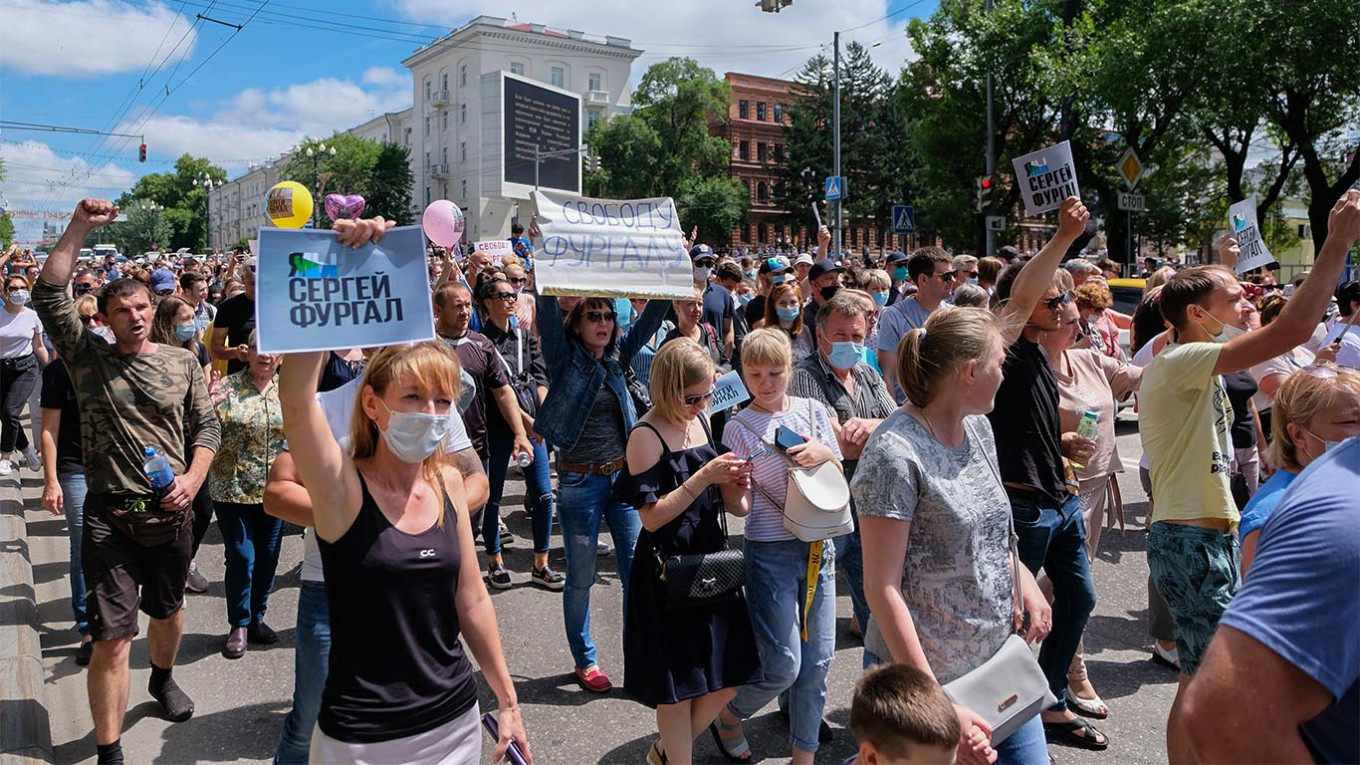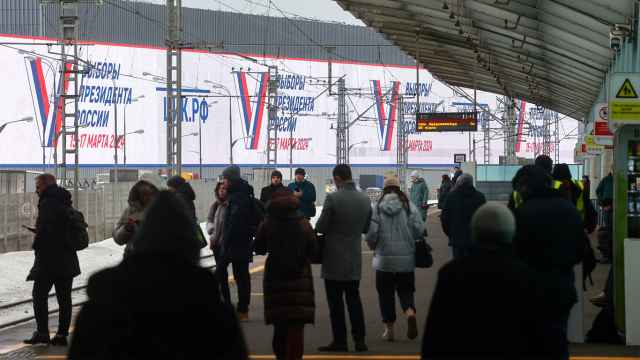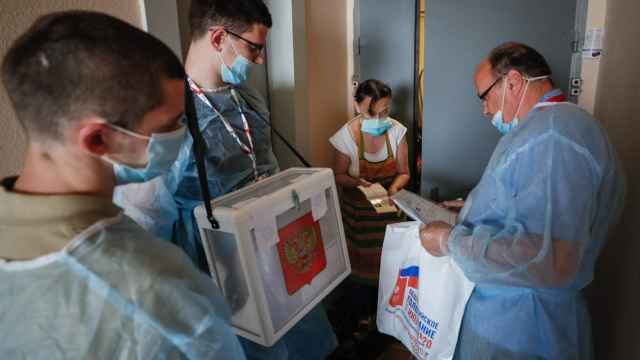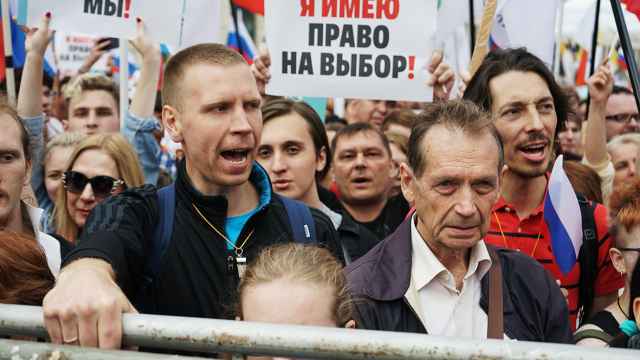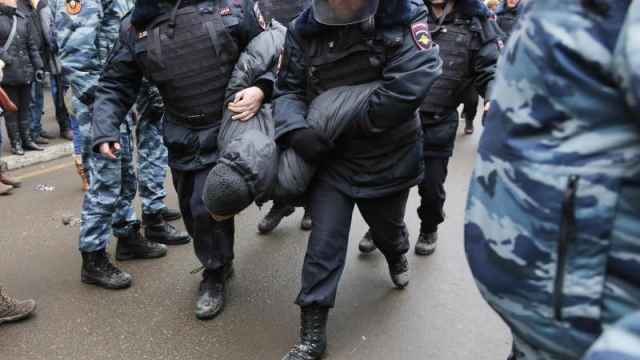For as long as Valery Nechayev could remember, the ruling United Russia party had been in charge of his home region of Khabarovsk in Russia’s Far East. And, for a while, that was just fine.
But as the years went by, the 23-year-old chef’s trust in the party’s officials waned. Investigations into their finances by Kremlin critic and opposition politician Alexei Navalny’s local team revealed what Nechayev saw as corrupt practices, underscoring his gradual realization that life in Khabarovsk, near Russia’s border with China, left much to be desired.
So in September 2018, when the region went to the polls for gubernatorial elections, Nechayev decided to vote for change. At the time, many of his fellow residents were upset that United Russia had raised the retirement age — a decision that sparked nationwide protests and sent the party’s ratings plummeting — and so they placed their confidence in a candidate representing a party that had spoken out against the decision.
That was Sergei Furgal, a former timber and scrap metal trader who had been a lawmaker in Russia’s lower house of parliament, the State Duma, for the previous 11 years. Last week, Furgal, 50, was detained on charges of ordering the murders and attempted murders of several businessmen in 2004 and 2005, and whisked to Moscow, where he will be held in pre-trial custody for the next two months. He has said he didn’t commit the crimes.
To widespread surprise, the move sparked the largest protests Khabarovsk has seen since the collapse of the Soviet Union in 1991, with as many as 40,000 people in a city of nearly 600,000 taking to the streets on Saturday.
Coming just days after Russia passed a constitutional overhaul that will allow President Vladimir Putin to remain in office until 2036, protesters saw Furgal’s arrest as politically motivated. They have pointed out that, if he is indeed guilty of the crimes — the plausibility of which few have denied — Moscow turned a blind eye to it for years while he was a deputy.
Although the protests have waned in numbers — down to the hundreds — they have nonetheless continued each of the four days since. In interviews this week, local activists told The Moscow Times they plan to continue rallying until Furgal is given an open trial in Khabarovsk, where his alleged crimes took place, rather than in the Russian capital.
“This is our main demand,” Nechayev, who said he is one of dozens of protesters helping organize another large-scale rally for this Saturday, said by phone. “We made our choice and we have to take responsibility for it — without interference from Moscow.”
‘The people’s governor’
Back in 2018, Nechayev voted for Furgal despite the fact that he ballotted with the far-right Liberal Democratic Party of Russia (LDPR) — which historically feigns opposition to the Kremlin but in effect does its bidding as part of Russia’s so-called “systemic opposition” — because the candidate was not part of the status quo, he said.
“The idea was to try something new as long as it wasn’t United Russia,” Nechayev explained.
At the time, however, it wasn’t even clear that Furgal himself wanted the job, as he campaigned without so much as a slogan. Nonetheless, he forced incumbent United Russia governor Vyacheslav Shport into a surprise run-off.
“We had a conversation between the first and second rounds, and [Furgal] told me, ‘I’m not sure I need this,’” Alexei Kayan, a local blogger turned LDPR city parliament deputy, recalled.
But Furgal stayed in the race, and in the second round, he beat Shport in a landslide.
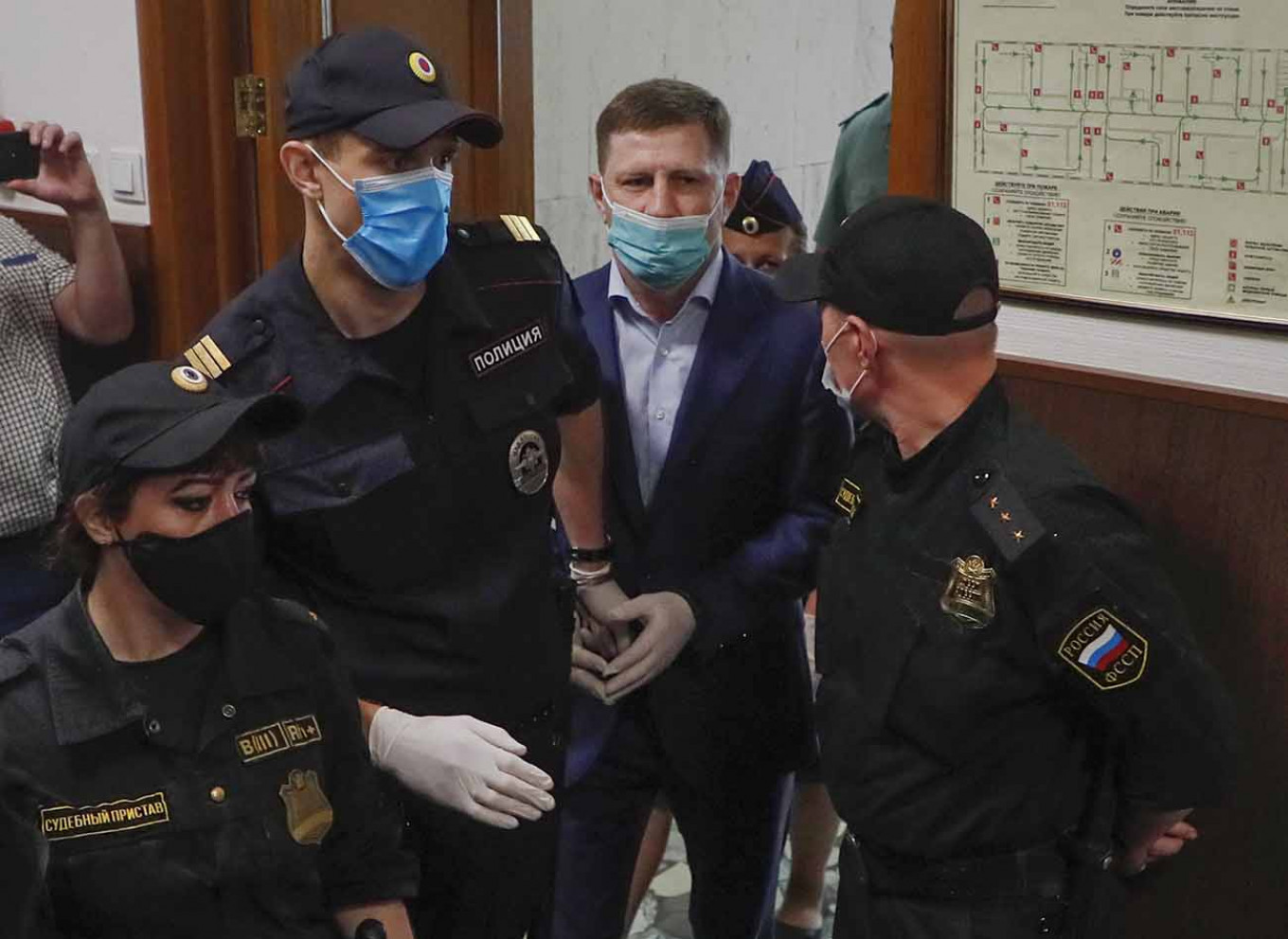
After the election, Furgal’s supporters interpreted two actions from Moscow as punishment for the vote. First, the Kremlin moved the Far East’s capital from Khabarovsk to the city of Vladivostok. Then investigators detained former governor Viktor Ishayev, who had publicly supported Furgal.
With United Russia majorities in the Khabarovsk city and regional parliaments, Furgal began to cut a resistance figure — an image buttressed by his joining protesters on the streets, and even visiting with the head of Navalny’s local office. Nechayev also pointed to decisions Furgal made to cut his own salary, ban first-class flights for officials and try to sell the regional government’s $1 million yacht — though he couldn’t find a buyer — as other positive changes. All of this helped Furgal become “the people’s governor,” Andrei Pertsev, a journalist who has closely tracked his rise, wrote last week.
A year later, in September 2019, the region held city and regional parliamentary elections, and LDPR routed United Russia, taking all but one of the 35 seats in the city parliament and all but two of 24 in the regional parliament.
“People went to vote to defend their choice,” said Kayan, who was lifted into office on that wave. “If before people weren’t so political, after [Furgal’s] election they started closely following what’s happening.”
Too popular
According to the investigative Novaya Gazeta newspaper, 82% of Russian mayors and governors have had cases opened against them while in office. The paper sees this practice as a way of keeping local officials in line with the so-called “power vertical” that Putin has cultivated since the beginning of his rule.
While nearly half of those cases relate to crimes like fraud, the paper also found that 128 Russian officials have been charged with murder over the past six years.
Alarms that Furgal might be next in line sounded by the end of 2019, when authorities raided a firm reportedly connected to the governor and arrested his former business partner on murder charges.
Furgal likely got the message. In the lead-up to the constitutional vote that ended on July 1, he pitched voters to vote for the reforms.
Still, the Khabarovsk region had one of the worst turnouts nationwide with only 44% of eligible voters visiting the polls, and only 63% voting yes compared with 78% nationwide.
After Furgal’s arrest, two fellow LDPR deputies from the region were also detained in cases connected to fraud.
“He became too popular from the view of the federal center, and the dossier that is kept for all representatives of the elite was taken out,” said Andrei Kolesnikov, chair of the Domestic Politics Program at the Carnegie Moscow Center. “This is a reminder to others of how the Kremlin will fight political opponents.”
If protests continue, worries will grow that the Kremlin will crack down. After last summer’s demonstrations in Moscow over fair elections, four activists were handed long prison sentences.
In the Kremlin’s only comments on the discontent so far, spokesman Dmitry Peskov on Tuesday said the protests could worsen Khabarovk’s coronavirus outbreak, which has seen the most deaths from the virus among Far Eastern regions.
But while troops from Rosgvardia, Russia’s national guard, have been sent to the city, they have yet to break up any of the protests.
Still, Alexei Mukhin, head of the Center for Political Information, a Moscow-based think tank, believes the Kremlin will find a way to stamp out discontent if it continues for much longer.
“The federal center won’t make any concessions,” he said. “It needs to show that it can’t be bent.”
‘Can be different’
That’s why Timofey, 25, asked that his last name be withheld. Although he wants to continue protesting, he said he doesn't believe street rallies can make any great changes on their own, and so he doesn’t want to spend time behind bars for participating in them.
Still, the number of people that took to the streets Saturday has changed his sense of what’s possible.
“I never thought we would see more than 500 people at a rally. Before all this, we would always laugh and say, well, it’s Khabarovsk, it’s Russia,” Timofey said. “We’ve seen that things can be different.”
Opposition politician Navalny has pointed to his Smart Voting strategy — guiding voters to cast their ballots in elections for any candidates other than those representing United Russia, even if they represent systemic opposition parties, as his allies are typically barred from the ballot — as a contributor to Khabarovsk’s shifting political landscape.
Those parties could become increasingly useful for Navalny’s aims. As a result of Furgal’s arrest and the ensuing protests, they will become less loyal to the Kremlin, political analyst Alexander Kynev argued this week.
“They will not only start to be perceived as being persecuted, but the role of the more opposition-minded and aggressive factions inside [the parties] will grow,” he wrote.
That seems to have already been the case in Khabarovsk — even before Furgal’s arrest.
Kayan, the city deputy, said he balloted with LDPR last year because he “felt that the party here is tied to the governor,” not its notorious nationalist leader Vladimir Zhirinovsky in Moscow.
As for residents of Khabarovsk, if they weren’t sure about casting their ballots for parties other than United Russia before Furgal, they’ve now gotten a taste.
“No one said that [Furgal’s] a saint. We knew that he was part of the systemic opposition,” protester Timofey said, by way of explaining his vote back in 2018. “But we also saw what he could do. Life got better.”
A Message from The Moscow Times:
Dear readers,
We are facing unprecedented challenges. Russia's Prosecutor General's Office has designated The Moscow Times as an "undesirable" organization, criminalizing our work and putting our staff at risk of prosecution. This follows our earlier unjust labeling as a "foreign agent."
These actions are direct attempts to silence independent journalism in Russia. The authorities claim our work "discredits the decisions of the Russian leadership." We see things differently: we strive to provide accurate, unbiased reporting on Russia.
We, the journalists of The Moscow Times, refuse to be silenced. But to continue our work, we need your help.
Your support, no matter how small, makes a world of difference. If you can, please support us monthly starting from just $2. It's quick to set up, and every contribution makes a significant impact.
By supporting The Moscow Times, you're defending open, independent journalism in the face of repression. Thank you for standing with us.
Remind me later.



